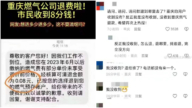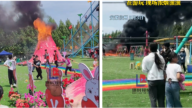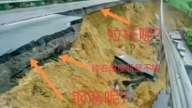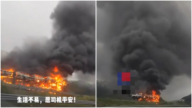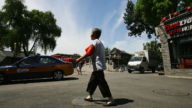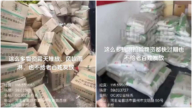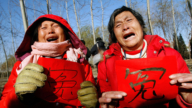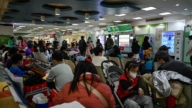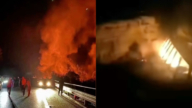【新唐人2012年3月3日讯】3月1号明镜新闻网报导,有消息说︰中共军委主席胡锦涛下令对中共军队副总参谋长章沁生停职,因为他在军中主张“军队国家化”。消息还没有得到中共当局证实。而《法国国家广播电台》证实了章沁生被停职的消息,但停职的原因,是否是因为章沁生在军中有主张军队国家化的言论,目前还不得而知。不过,有学者认为,章沁生被停职,可能和中共18大派系权斗有关。
“哥伦比亚大学”政治学博士王军涛认为,如果在中共高层内提出“军队国家化”,主张军队不要服从于某一个利益派别,或个人的利益需要,这本身还不完全是西方民主制度下的军队和政府的关系。
王军涛:“西方民主的关系强调军队不仅仅要忠于国家,而且这个国家(政权)本身应该是民选出来的,执政者应当是在宪政架构中进行运作和领导这个国家。如果违背这个,军队就不效忠他,而且要恢复国家的宪政次序。”
目前,“军队国家化”通常作为衡量“民主国家”的重要指标,在大部分国家被写入宪法并成为信条。但在少数独裁国家如中国、朝鲜等,“军队国家化”仍属敏感议题。
旅美学者程晓农指出,中共军队自建军以后,共产党就把它定位为“只为党服务”的军队,并且要求军队无条件的听从党的命令,而不管是否符合国家或老百姓的利益。
程晓农:“如果军队一旦不聼共产党的(话),那麽共产党就再也维持不住了。所以共产党坚定的绝不放弃对军队的严密控制。而且强烈的阻止任何关于军队国家化的说法或者是想法。共产党的政权归根结底是要靠效忠于共产党的军队来支撑的。”
章沁生最后一次公开露面,是在2月27号总参谋部的一个会议上。
在此之前,有传言说,在年前军委的团派会上,章沁生大骂军中高官的儿子以权谋私,弄了百亿身家,而轰动会场。也有传言说,章沁生的这一行为激怒了军中大佬。
王军涛:“从军队的结构上看,(章沁生)他这种话、言论其实还很难得到实现。我觉得军队里可能不止两种声音吧,胡核心要保持对军队的领导权,还是用军队处理政治问题。也有人猜测,因此太子党可能也想控制军队,可能跟这个也有关系。太子党对他这样背景的人不放心,那麽可能也对他采取一些动作。”
据报导,在2005年中俄联合军演中,章沁生是中方参谋长。作为中共十七届中央委员的他,被认为本有可能成为总长或防长的候选人。
不久前,中将谷俊山因为涉及贪腐落马,现在再传章沁生被停职的消息。王军涛认为,这一系列军中的异常变动,和中共18大和18大后的权力分配格局有关。
王军涛:“这两个人被拿掉,会影响军中的权力,就是18大之后的权力,派系的对比和力量的对比分配。由于现在出现权力真空,军中各派可能竞争会比较激烈,多多少少会牵扯到18大前后的中共其他派系的权力布局,甚至会影响最高核心的权力分配。”
网上资料显示,章沁生生于1948年5月,山西孝义人。06年晋升中将军衔,07年出任广州军区司令员。09年12月出任总参谋部副总参谋长。
新唐人记者常春、王子琦、李若琳采访报导。
General Zhang Qinsheng Suspended from Duty before 18th National Congress
On March 1, Mingjing News reported rumors saying that the Chairman
of the Chinese Communist Party’s (CCP) Central Military Commission
Hu Jintao gave orders to suspend Deputy Chief of Staff Zhang Qinsheng
from active duty because Zhang wished to “nationalize “the military.
The French National Radio Station has confirmed the suspension,
but whether Zhang’s suspension was due to talk of nationalizing the military is still unknown.
Some scholars believe, that Zhang’s suspension might have something
to do with the power struggle during the 18th National Congress.
PhD in Political Science at Columbia University Wang Juntao
Believes that, proposing “nationalization of the military,”
and advocating that the military shouldn’t obey
any particular faction or person,
this suggestion is by itself not quite the same as the relation
between the government and military in western democracies.
Wang Juntao: “In western democracy, the military is not only
loyal to the country, but the government is also democratically elected.
The ruling party can only operate and lead the country according to
the constitutional framework. If (the ruling party) violates this rule,
then the military will not serve the party,
and will restore the country’s constitutional order.”
Currently, “nationalization of the military” is an important metric
that can be used to define democratic countries; most countries have this written into their constitution.
However, in a few dictatorships like China, North Korea,
and others, nationalization of the military is a sensitive topic.
Visiting scholar in the U.S Cheng Xiaonong expressed the view
that, since the CCP itself had formed the military,
the military position was “only to serve the party,” and
to unconditionally follow commands of the party, neglecting national or public interests.
Cheng Xiaonong: “If the military stops listening to the CCP,
then the CCP can’t sustain itself anymore.
This is why the CCP will never give up strict control
over the military, and will oppose suggestions or thoughts regarding nationalization of the military.
The CCP’s rule was fundamentally based on a military loyal
only to the CCP itself.”
Zhang Qinsheng’s last public appearance was during a meeting
at the General Staff Headquarters on Feb 27.
Before that, it’s been rumored that during a Central Military
Commission meeting,
Zhang Qinsheng cursed at sons of senior military officials
abusing their power, corrupting billions, then stormed out of the meeting.
There are rumors that Zhang’s action has
angered senior officials in the military.
Wang Juntao: “Looking at the military frame work, his (Zhang
Qinsheng) words, any discussion is hard to imagine.
I feel that the military can’t have two different voices;
Hu Jintao wishes to keep leadership of the military, and to do a deal with political issues using the military.
Some guessed, maybe the princelings also want to control the
military, so this suspension of duty might be related to that.
The princelings are not comfortable with someone with
his background, so they might have done something.”
According to a report, during the China-Russian joint military
exercise in 2005, Zhang Qinsheng was the Chief of Staff for
the Chinese regime. As a member of the 17th central committee,
he is candidate for Chief of Staff or Defense Minister.
Not long ago, lieutenant general Gu Junshan was taken out
on corruption charges, now Zhang Qinsheng has been suspended.
Wang Juntao believes that all this has to do with future power
distribution after the 18th National Congress.
Wang Juntao: “With those two taken out,
power in the military will be affected,
that is power distribution among the various factions
after the 18th National Congress.
Since some empty spots will be created, infighting in the
military will be intense;
this will influence power distribution among different CCP
factions and will influence power distribution at the highest level.”
According to online data, Zhang Qinsheng was born in May
1948 in Shanxi Xiaoyi. He became lieutenant general in 2006,
Commander of the Guangzhou Military Region in 2007.
In December of 2009, he became Deputy Chief of Staff.
NTD Reporters Chang Chun, Wang Ziqi and Li Ruolin



